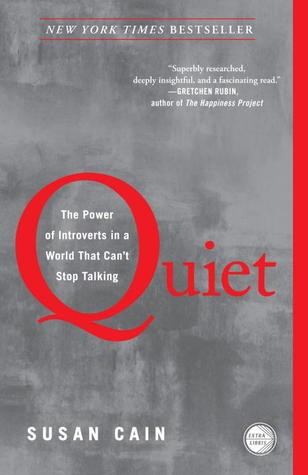Paperback, 352 pages
English language
Published Jan. 18, 2013 by Broadway Books.

Paperback, 352 pages
English language
Published Jan. 18, 2013 by Broadway Books.
Quiet: The Power of Introverts in a World That Can't Stop Talking is a 2012 non-fiction book written by Susan Cain. Cain argues that modern Western culture misunderstands and undervalues the traits and capabilities of introverted people, leading to "a colossal waste of talent, energy, and happiness".The book presents a history of how Western culture transformed from a culture of character to a culture of personality in which an "extrovert ideal" dominates and introversion is viewed as inferior or even pathological. Adopting scientific definitions of introversion and extroversion as preferences for different levels of stimulation, Quiet outlines the advantages and disadvantages of each temperament, emphasizing the myth of the extrovert ideal that has dominated in the West since the early twentieth century. Asserting that temperament is a core element of human identity, Cain cites research in biology, psychology, neuroscience and evolution to demonstrate that introversion is both common and normal, …
Quiet: The Power of Introverts in a World That Can't Stop Talking is a 2012 non-fiction book written by Susan Cain. Cain argues that modern Western culture misunderstands and undervalues the traits and capabilities of introverted people, leading to "a colossal waste of talent, energy, and happiness".The book presents a history of how Western culture transformed from a culture of character to a culture of personality in which an "extrovert ideal" dominates and introversion is viewed as inferior or even pathological. Adopting scientific definitions of introversion and extroversion as preferences for different levels of stimulation, Quiet outlines the advantages and disadvantages of each temperament, emphasizing the myth of the extrovert ideal that has dominated in the West since the early twentieth century. Asserting that temperament is a core element of human identity, Cain cites research in biology, psychology, neuroscience and evolution to demonstrate that introversion is both common and normal, noting that many of humankind's most creative individuals and distinguished leaders were introverts. Cain urges changes at the workplace, in schools, and in parenting; offers advice to introverts for functioning in an extrovert-dominated culture; and offers advice in communication, work, and relationships between people of differing temperament.